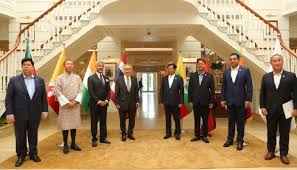New Delhi [India]: As the two-day BIMSTEC Foreign Ministers’ Retreat drew to a close, External Affairs Minister S Jaishankar on Friday lauded the summit as “productive” and described the meetings as “highly useful.”
Foreign Ministers from member countries of the Bay of Bengal Initiative for Multi-sectoral Technical and Economic Cooperation (BIMSTEC) grouping gathered in the national capital to bolster cooperation among Bay of Bengal countries.
BIMSTEC is a regional organisation comprising 7 member states – Bangladesh, Bhutan, India, Myanmar, Nepal, Sri Lanka, and Thailand.
Earlier today Prime Minister Narendra Modi met the visiting BIMSTEC member countries and discussed an array of issues, including regional cooperation.
Apart from ways to strengthen regional cooperation, the talks also featured improving connectivity, energy, trade, health, agriculture, science, security and people-to-people exchanges.
In the meeting, PM Modi conveyed full support to Thailand for a successful BIMSTEC Summit. The meeting was also attended by External Affairs Minister S Jaishankar, Union Minister of State (MoS) for External Affairs, Pabitra Margherita, and National Security Adviser Ajit Doval.
Glad to meet BIMSTEC Foreign Ministers. Discussed ways to strengthen regional cooperation, including connectivity, energy, trade, health, agriculture, science, security and people-to-people exchanges. Conveyed full support to Thailand for a successful Summit.@BimstecInDhaka pic.twitter.com/fJ9yvtYyXE
— Narendra Modi (@narendramodi) July 12, 2024
“Glad to meet BIMSTEC Foreign Ministers. Discussed ways to strengthen regional cooperation, including connectivity, energy, trade, health, agriculture, science, security and people-to-people exchanges. Conveyed full support to Thailand for a successful Summit,” said PM Modi in a post on X.
A day ago, addressing the BIMSTEC Foreign Minister’s Retreat in the national capital, External Affairs Minster Jaishankar articulated India’s strategic alignment with the BIMSTEC, highlighting its significance within the country’s broader geopolitical frameworks like – Neighbourhood First, Act East Policy and SAGAR vision.
“For India, BIMSTEC represents the intersection of its ‘Neighbourhood First’ outlook, the ‘Act East Policy’ and the ‘SAGAR’ vision. Each of these endeavours is being purposed with a specific focus on the Bay of Bengal, where collaborative potential has long remained underrealised,” Jaishankar said.
He added, “Our challenge is to change that for the better, and to do so rapidly. The retreat is meant to exchange ideas openly, candidly and fruitfully. We all benefited from the last such exercise in Bangkok.”
Stressing the importance of the Summit, he said, “This one now has a particular importance as it serves to prepare strong outcomes for the Summit to be held later in the year. Our message should be clear – that we are all determined to infuse new energies, new resources and a new commitment into cooperation among the Bay of Bengal nations.”
Highlighting the recent developments within BIMSTEC, Jaishankar noted, “The BIMSTEC Charter, for a start, has come into effect from 20 May this year. Global and regional developments also make it imperative that we find more solutions amongst ourselves.”
The first edition of the BIMSTEC Foreign Ministers’ Retreat was held in Thailand’s Bangkok on July 17, 2023. In an earlier press release, the Ministry of External Affairs (MEA) stated, “The Retreat will present an opportunity for the Foreign Ministers of the BIMSTEC countries to discuss, in an informal setting, avenues to broaden and deepen cooperation across various sectors including in the fields of security, connectivity, trade and investment, people to people contacts etc, in the Bay of Bengal region and littoral.”
BIMSTEC is a regional organisation that connects countries around the Bay of Bengal to promote economic growth, trade, and cooperation in areas like transportation, energy, and counter-terrorism.
It aims to strengthen relationships and foster economic development among its member states, which include- Bangladesh, Bhutan, India, Myanmar, Nepal, Sri Lanka, and Thailand.
BIMSTEC stands as a beacon of regional collaboration, striving to achieve rapid economic development and social progress through joint initiatives among its member states. Founded on principles of equality and partnership, BIMSTEC aims to address common challenges and capitalise on shared opportunities across seven strategic sectors.
Each member nation leads specific sectors, reflecting their expertise and commitment to collective advancement:
Bangladesh spearheads trade, investment and development, including the blue economy, leveraging its strategic location and maritime resources.
Sri Lanka focuses on science, technology and innovation, including health and human resource development, fostering advancements in research and human capital.
Bhutan leads efforts in environment and climate change, including the mountain economy, emphasising sustainable practices in the face of ecological challenges.
India takes charge of security, including energy and disaster management, contributing expertise in disaster preparedness and strategic energy management.
Myanmar oversees agriculture and food security, including fisheries and livestock, supporting food sustainability and rural development.
Nepal drives people-to-people contact, including poverty alleviation, promoting cultural exchange and poverty reduction initiatives.
Thailand leads connectivity efforts, enhancing regional infrastructure and transport networks to facilitate seamless connectivity among member states.
BIMSTEC also emphasises cooperation with international and regional organizations, aligning its goals with global development agendas to maximize impact. With a commitment to mutual assistance, joint projects, and capacity building, BIMSTEC seeks to translate its collaborative efforts into tangible benefits that improve living standards and promote inclusive growth across the Bay of Bengal region.


